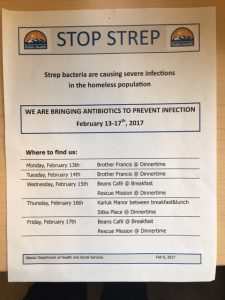 There’s an outbreak of a newly identified, rare strain of Group A Streptococcus bacteria in Anchorage that’s mostly impacting people who are experiencing homelessness. Public health workers will be visiting Brother Francis Shelter, Beans’ Cafe, and other services this week to distribute antibiotics and antiseptics to try to stop the spread of the disease.
There’s an outbreak of a newly identified, rare strain of Group A Streptococcus bacteria in Anchorage that’s mostly impacting people who are experiencing homelessness. Public health workers will be visiting Brother Francis Shelter, Beans’ Cafe, and other services this week to distribute antibiotics and antiseptics to try to stop the spread of the disease.
State epidemiologist Joe McLaughlin said the bacteria is fairly common. Most healthy people don’t show any symptoms or just have mild skin or throat infections. But if a person’s immune system is already compromised, then the bacteria can enter into a small cut and lead to major infections, toxic shock syndrome, or amputations.
“The homeless population is more at risk in general for these types of invasive diseases because they’re at higher likelihood to have other chronic conditions,” he explained during a phone interview. “They might also have decreased access to care and decreased opportunities for self care and personal hygiene.”
The outbreak started in Fairbanks over the summer then died down. It spread to Anchorage in the fall. There have been seven to 10 severe cases per month since October. Ninety percent of the patients were homeless. Four people have died.
Epidemic Intelligence Service Officer Emily Mosites, who is with the Center for Disease Control in Anchorage, said this outbreak has been hard to stop. The bacteria spreads through human contact, like coughing near someone or touching, and it’s impacting a very mobile population. But she stressed that most people should not worry.
“The main thing to keep in mind here is the risk in the general population is very low,” she said. “Right now we’re still seeing it in the homeless population, and we’re taking as many steps as we can to try to control it there.”
The newest step is going to different service providers this week to hand out single-dose antibiotics and antiseptic washes, to kill the bacteria before it causes more severe infections.
Mosites said the epidemiologists have been working with the clinic at Brother Francis Shelter since November to identify and treat cases early on, and to contact people who could be at risk for infection.
Anne Hillman is the healthy communities editor at Alaska Public Media and a host of Hometown, Alaska. Reach her at ahillman@alaskapublic.org. Read more about Anne here.





